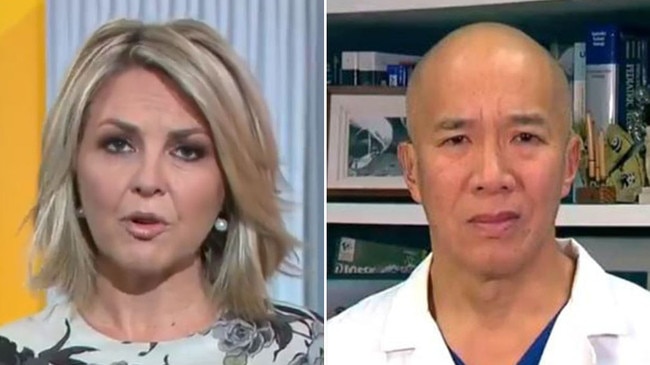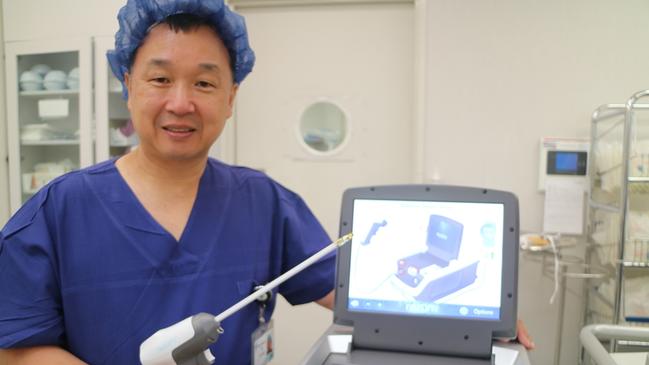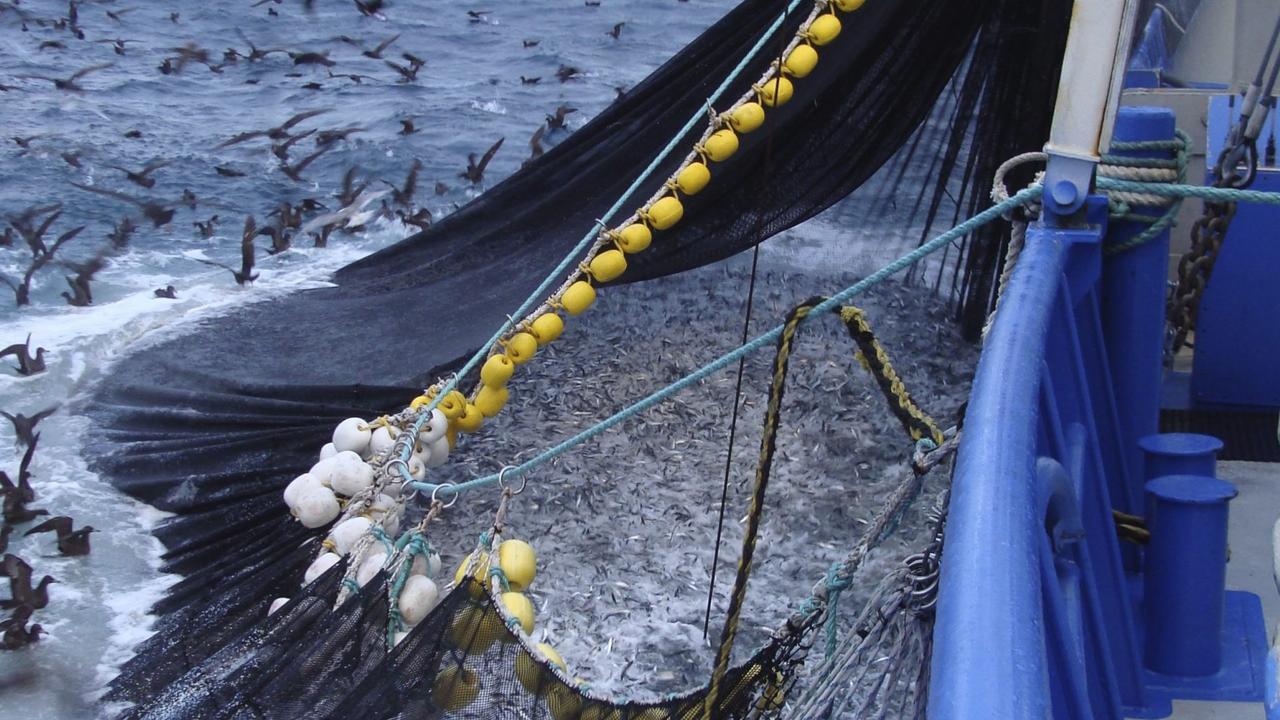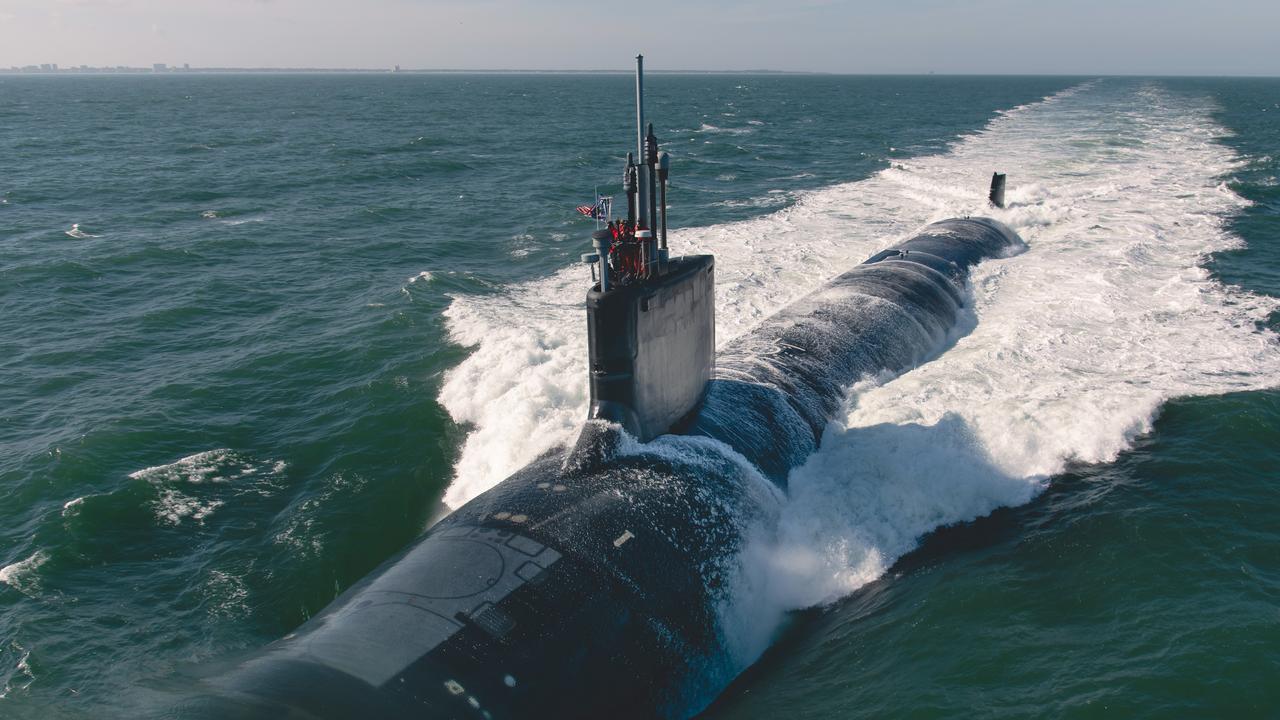Charlie Teo: brain surgeon defends six-figure op costs
Charlie Teo tells a TV host to get her facts straight and takes a swipe at a medical critic | WATCH

Brain surgeon Charlie Teo has told a television host to get her facts straight after he was questioned about the practice of accepting six-figure sums raised for cancer patients through crowd-funding to pay for his services.
Appearing on Nine’s Today this morning, Dr Teo defended his fees when quizzed by host Georgie Gardner to perform life-saving surgery.
Dr Teo’s comments came after prominent Sydney urological surgeon Henry Woo used Twitter to question the “really disturbing trend” of people launching online fundraising campaigns to be treated by Dr Teo at the Prince of Wales Private Hospital.
Some campaigns have raised more than $120,000 in the hope Dr Teo can extend or save someone’s life.
Professor Woo, from the University of Sydney and Chris O’Brien Lifehouse, pointed to 113 GoFundMe campaigns and said if it was “valid surgery”, it should be provided in the public system and not leave patients destitute.
Gardner asked Dr Teo to explain why, if he was offering a valid procedure, the surgery was not covered by Medicare and the public hospital system.
“Let’s get our facts straight first,” he said. “The fact is, although some patients do have to pay over $100,000, that doesn’t all go to the surgeon or even the team.
“It is in a private hospital, which is accounting to their shareholders. They have to make a profit.
“So, for example, that $120,000 bill that Henry Woo is talking about, $80,000 to the private hospital. $40,000 then gets dispersed among not only the surgeon, the assistant, anaesthetist, pathologist, radiologist, radiographer. It is not that great an amount to each individual person, when you get your facts straight.’’
Dr Charlie Teo defends the high cost of his procedures, instead putting the onus on other neurosurgeons who won't swallow their egos and says "I would do it free of charge" if Australia's healthcare system covered the costs. #9Today pic.twitter.com/mwjmuMU8Se
— The Today Show (@TheTodayShow) May 28, 2019
Gardner then pressed Dr Teo to reveal how much he would would personally get under such a scenario.
“I got $8000,” he said. “But it is really not the total amount that each person gets. It is really the fact that people do have to pay for their private healthcare.
“It is a little bit unfair. If I was a child with cancer and in a foreign state who wants the very best care, I think you should be able to be done in the public system.’’
Dr Teo slammed the social media storm over his fees and took a swipe at Professor Woo.
“The whole Twitter thing is all about trying to destroy or discredit my reputation,” he said. “I would say to that person, ‘Listen, there is a lot better things to do we should be doing as doctors rather than trolling through websites looking for ways to discredit a colleague’.
“Get back to your lab, try and find a cure for prostate cancer. I will try and find a cure for brain cancer, thank you.”
The controversy over Dr Teo’s practices prompted the Australian Medical Association and Royal Australasian College of Surgeons to yesterday remind surgeons of their responsibility to avoid excessive fees and ensure patients could provide informed financial consent.
AMA ethics chair Chris Moy said money should not be a barrier to treatment. He said most services were provided with no out-of-pocket costs for the patient or for a known, and often relatively small, gap fee. “Certainly, the AMA would totally be opposed to the use of things like scarcity of treatment or reputation, for example, to exploit desperate people,” Dr Moy said.
RACS executive director of surgical affairs John Quinn said the procedures offered by Dr Teo were already available in the public system and patients should not have to fundraise, mortgage their houses or access their superannuation to pay for them elsewhere.
Dr Quinn declined to comment on Dr Teo’s practice or the market for his services, saying that was a matter for the neurosurgeon and his patients but he reiterated the need for informed financial consent.
“The college’s view is that it is unethical to charge exorbitant fees or to exploit patients or their families in vulnerable situations,” he said.
Dr Quinn told the ABC: “Those who think if they pay a greater fee that they will get a better service are misguided and misled.’’
Dr Teo told The Australian he had been unable to do more public work in his 30-year career because hospitals would not cover the cost of his high-stakes operations and other neurosurgeons felt threatened by him.
“Am I as good as people say I am? If you speak to any neurosurgeon in Australia, they will say it’s all rubbish … so why is it I am lauded and seduced overseas by the best hospitals? Surely there is something to that.”

Dr Teo said he had previously asked NSW Health whether he could operate in the public system but it would have blown its budget: his many interstate patients could be referred there but the home state would not cover the cost.
If NSW Health had accepted, as Dr Teo argued, that he was providing a different level of skill for cases others might deem futile, he could potentially have established a Centre of Excellence. But that, he said, would have required other Australian neurosurgeons to endorse him — a rare occurrence.
“It’s all these egos of doctors who aren’t prepared to say ‘Oh, this person is doing it better or that hospital is doing it better or that unit is doing it better’,” Dr Teo said last night.
He said he offered all his prospective patients surgery with no out-of-pocket costs if they could convince their doctors to formally invite him to operate in the public system.
Dr Teo alluded to a recent case where a patient was fundraising and, unable to afford the upfront cost of surgery, convinced their doctors to invite him to work in the public system.
Yet that was a rarity, he said. For his patients at the Prince of Wales Private Hospital, an upfront fee of $120,000 might include $40,000 for the various practitioners — “granted, I get the largest cut of the pie” — but the rest went to the hospital.
Dr Teo accepted that the hospital set a fee it thought was reasonable because of the complexity of his cases and that “occasionally I get a bad outcome and a patient is stuck in hospital” longer than anticipated. “Most patients with keyhole brain surgery are out within one day, which … usually (for other neurosurgeons) brings in a fee of $35,000,” he said. While surgical outcomes are not published, Dr Teo said he had performed about 11,000 operations and despite the bullying and opposition, had built a positive reputation for himself.
The federal government will next year launch a website providing data on the range of fees being charged for certain medical services to help patients provide informed financial consent.


